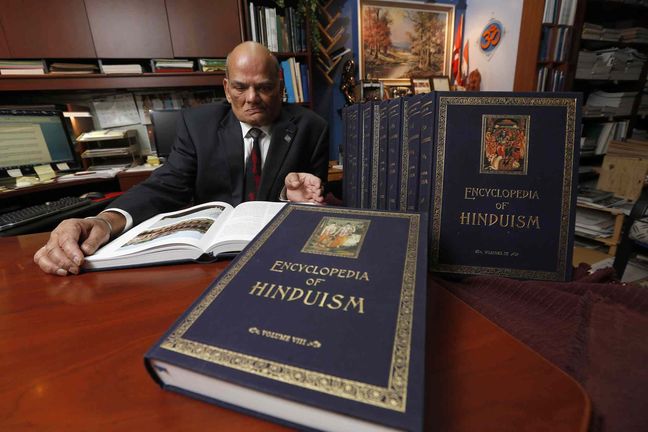It took two decades and a quality-control engineer to oversee it, but the world’s first book about the Hindu faith written in English is complete.
The 10-kilogram, 11-volume and 7,200-page Encyclopedia of Hinduism was on display in Winnipeg Sunday at the Diwali festival at the RBC Convention Centre Winnipeg.
“It’s the first of its kind,” said Winnipeg’s Madhav Sinha, one of the project’s quarterbacks with the India Heritage Research Foundation that set out to write the book on the world’s third-largest religion.
“I was in charge of quality,” said the quality expert and founder of the Canadian Society for Quality.
His mantra of making things right the first time is one of the reasons it took so long to complete an encyclopedia of the world’s oldest and arguably its most multifaceted and complex religion. The challenges were huge, said Sinha.
Hinduism has been described as a conglomeration of religious, philosophical and cultural ideas and practices that originated in India, characterized by the belief in reincarnation, one absolute being of multiple manifestations, the law of cause and effect, following the path of righteousness and the desire for liberation from the cycle of births and deaths.
To explain it all in English would be a massive undertaking and something no one had even ventured to begin, until the head of one of India’s largest spiritual institutions believed it was time to share Hinduism with the rest of the world.
“In 1987, it was the brainchild of Pujya Swamiji,” said Sinha. He was referring to Chidananda Saraswati, spiritual head of the Parmarth Niketan Ashram in India and founder of the Hindu Jain Temple in Pittsburgh. Swamiji led a fundraising drive in Hindu communities around the world to launch the project.
It took more than 1,000 scholars working in several different countries nearly 18 years to complete it, said Sinha.
“The people who were writing it didn’t know English.”
Their contributions were reviewed, translated into English then reviewed again. “Things had to be written and rewritten eight to 10 times,” said the quality-control expert. “They had to make sure everything was perfect.”
Back then, it wasn’t just a matter of cutting and pasting changes in a Word document — it was much more painstaking, he said.
“Imagine — in those days, there were no computers, no Internet,” Sinha said. Many of the scholars wrote their contributions in longhand, said Sinha.
Through his years of volunteer work on The Encyclopedia of Hinduism, Sinha said his biggest reward was meeting Swamiji and the Dalai Lama, the spiritual leader of Buddhists in Tibet and around the world.
“It was fascinating — what a gift of God!”
The finished product contains 7,000 entries, five million words and 2,500 full-colour illustrations.
Sinha says it sells for $1,000 and has been available for purchase online through Amazon since last year. It was unveiled to Winnipeggers over the weekend at the Diwali festival of lights hosted by the Hindu community at the convention centre. Manitoba is home to as many as 30,000 Hindus, said Sinha. When the project began, there were only 10,000, he said.
There are plans to translate the encyclopedia into Hindi, one of India’s two main languages, and make it available online, Sinha said.
He hopes the English volumes will be read by non-Hindus who want to understand the religion and India with its billion-plus people — the majority of whom are Hindus. Most of all, the grandfather hopes it will open doors of understanding to the practice for English-speaking children of Hindus around the world.
“It will give them a better understanding of the mind, body and spiritual connection,” said Sinha.
Hinduism doesn’t have all the answers but helps people ask questions about how to live and recognize the interconnectedness of all humanity, said Sinha.
“Everybody has responsibility.”






